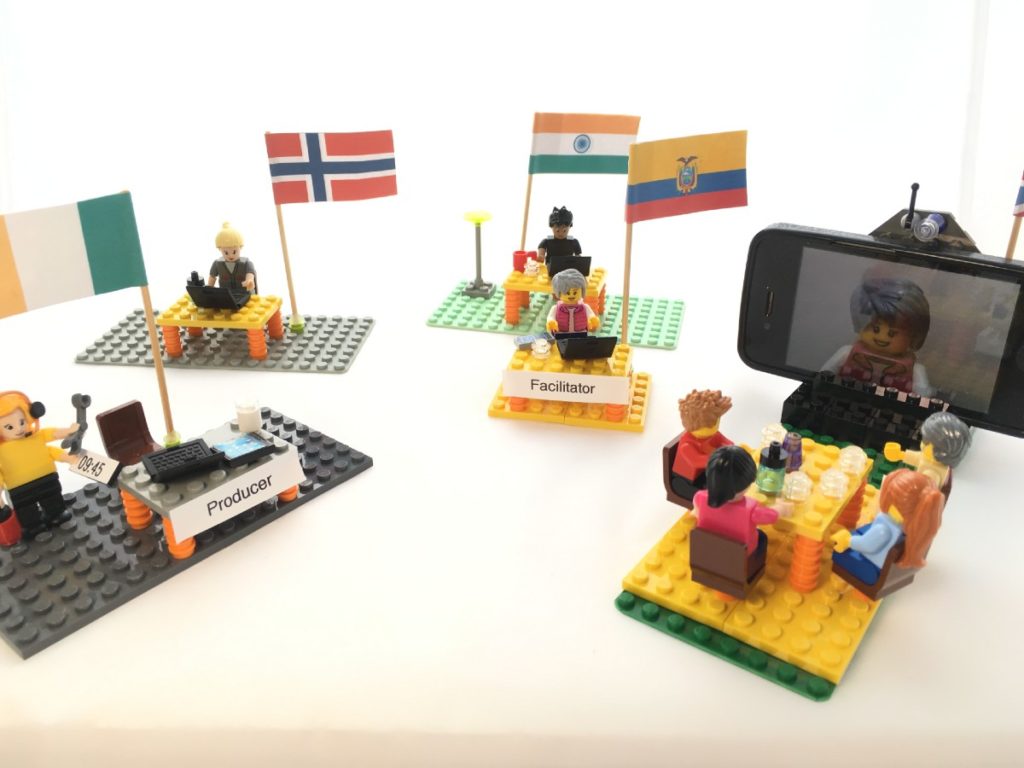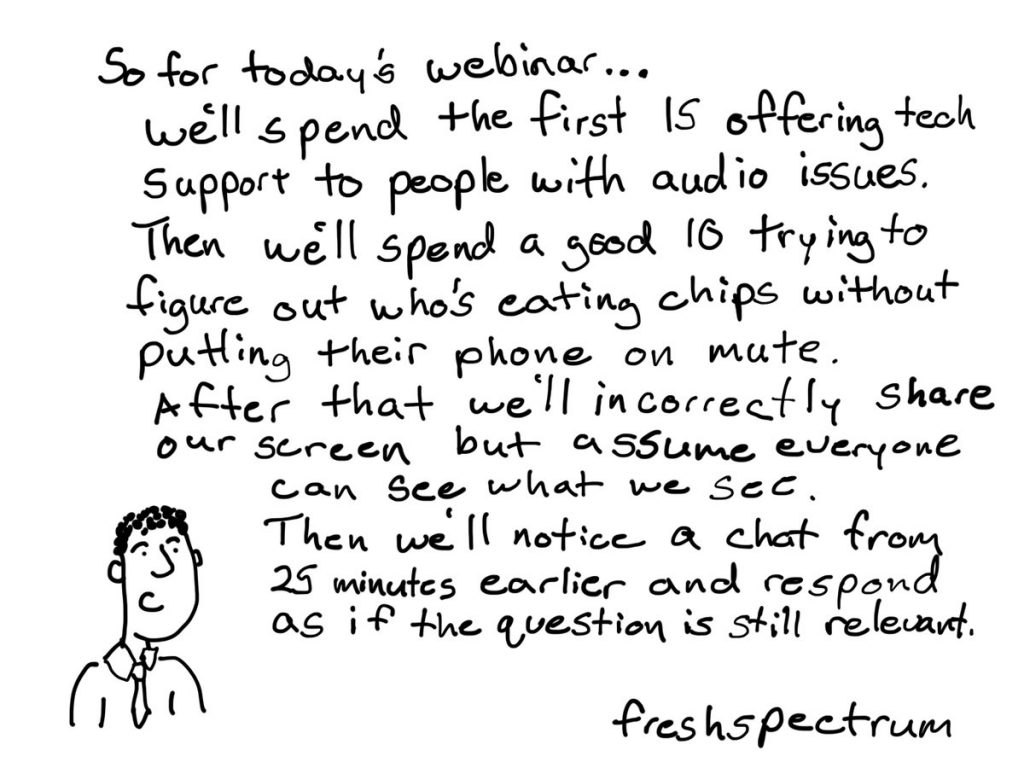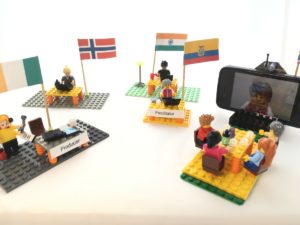Author Archives: orlaadmin
Feb
The joy of hybrid
We had an exciting week of it, delivering an in house version of our Designing and Facilitating Hybrid events course. Up to 45 minutes before we were due to merge our Roomies and Zoomies into one beautiful whole, the Roomies were detained outside their building by a security crisis. Our ‘backchannel’ worked beautifully, and our resourceful Room Liaison managed to have everyone marshalled inside in time to start.
Later in the week, a conference room tech configuration refused to work. In a matter of moments, we pivoted the Roomies to a different configuration, gave them camera and workspace access via Zoom, while they moved rooms and then used a single computer mic and speaker for speech.
Such wonderful examples to add to the wealth of case studies we’ve developed – the first of these illustrates the importance of well briefed and dedicated Liaison, and the second illustrates how important it is to be able to rapidly think through and reconfigure mic, speakers, cameras and workpaces.
We’ll share all these insights, and many more, on our next Designing and Delivering Hybrid Events public course – there are a few seats left and we start on 28th February! Booking here: ICA:UK.
We’ are: myself, Kim Roth Howe, Una McAlinden, Oscar Wouters Duran.
Feb
Design principles for humane hybrid events
Hybrid gatherings have been happening for years, from the team meeting where we arrive and hear that ‘Mary is going to dial in’, to a company wide ‘all hands’ meeting where national teams convene in conference rooms around the globe. Many organisations are starting to plan for hybrid gatherings in anticipation of at least partial lifting of lockdown.
Many facilitators, myself included, when approached to design a hybrid event, start with ‘are you *really* sure you want one?’! A hybrid event is effectively three events comprising: the people co-located in a physical space (the ‘Roomies’), the people who are joining by phone or virtual meeting platform (the Zoomies), and the meeting where you are trying to link all of these participants together: the Full Catastrophe, as Zorba the Greek might call it.
I have spent lots of time trying to map the variations of hybrid meetings using pods and nodes and network diagrams, but I realised that was a little like planning to bake a cake and only thinking about the receptacle – round tin or square tin or muffin tins or even paper bun cases – rather than focusing on whether I wanted a lemon drizzle cake, or banana bread or [insert your favourite lockdown treat here!]. I want my cake to be tasty and perhaps even a bit healthy, and I’ll probably manage to make it roughly the right flavour and texture, regardless of the kind of tin I use. Similarly, I want to help people achieve their aims for an event, regardless of the technical configuration of wires and pods and nodes. ‘Hybridity’ is the means rather than the end. We don’t set out to have a ‘hybrid’ meeting, we set out to bring people together to achieve something.
So, let’s leave aside the different containers and configurations and logistics to focus on what’s really important. There are two crucial elements particular to hybrid gatherings which, if we get them right, will help people do the work they have convened to do, and help them to actually thrive doing it. I’ve called these two elements ‘coherence’ and ‘connection’.
‘Coherence’ is the extent to which everyone can contribute to and receive all parts of the event. This particularly refers to having access to other participants’ (verbal or written) contributions (as distinct from just the input of keynote speakers or panels). Literally and metaphorically, it means everyone being ‘on the same page’, even as that page fills up with questions, ideas, insights and other contributions from participants. It enables people to feel heard, whether that is in writing, or verbally.
Coherence is an aspect of events that we can take for granted when we are all co-located in either virtual or physical space but it requires really careful design when people are working in different spaces. Different media and tools become vital, for example flip charts, ‘stickies’, virtual whiteboards, or shared electronic documents.
As a simple example, in a workshop with GlobaltFokus, where the trainer and producer were remote and the participants were co-located, participants photographed the flip charts they generated in their small group work and uploaded them to the (virtual) meeting platform we were using. This enabled the trainer and all the other participants to see each group’s material projected on a screen, and discuss them during plenary.
Connection is the extent to which everyone in the room has an opportunity for some meaningful human interaction. That can be obtained from interacting with others in general, but it becomes a more compelling and richer experience when it occurs with a more intimate pair or small group (up to 5). This kind of connection often starts to happen naturally at face to face events, over coffee, while we’re waiting to start, and during breaks. We’re all getting much better at building it into virtual events, using a range of tasks and tools to enable people to have conversations in smaller groups, with breakouts being the best example. But once we move into hybrid events, it is all too easy, particularly in relation to social time, to let the ‘Roomies’ do their own social thing, and leave the remote ‘Zoomies’ to step away by themselves. This has the effect of creating two diverging meetings – the virtual one and the face to face one, and it particularly disadvantages the remote participants. Of course, remote participants may be able to get light relief, stimulation and empathy from others in their immediate location (though not even that at the moment, where so many of us are working in solitary home offices), but putting real thought and effort into helping everyone build some familiarity, empathy and understanding with at least some other participants will help to increase engagement at the event and commitment to the outcomes, and will create an experience of inclusion, of really mattering. All of these make it easier to keep people present and involved, to identify and address dissent and resolve conflict, to sow the seeds for consensus, and crucially, to support participants towards collective action.
In an event we facilitated recently, with 11 co-located participants and two remote participants, we used a separate, lighthearted messaging channel where photographs and snippets were shared among all event participants, whether co-located or remote. This simple addition helped to give the Zoomies a sense of being remembered and included, and helped to remind the Roomies that there were important voices outside the main room.
There’s plenty more to talk about in relation to how to do all of this, and I’ll save that for my next post, but let’s cut to the chase cake: participatory, engaging and productive hybrid events can be delivered by using the concepts of coherence and connection to design a unified – and unifying – event for all participants.
Tagged | collaboration, facilitation, hybrid, leadership, meetings, participation, remote teams, teamwork, virtual facilitation, virtual meetings, virtual workshops
Jul
Virtual facilitation training
Now taking bookings for the next round of our Facilitating Great Virtual Events course. Starting 15th September, and already filling up! https://www.ica-uk.org.uk/course/facilitating-virtual-events-i-online-i-sept/

Tagged | facilitation, virtual facilitation, virtual workshop; facilitation;
May
Virtual facilitation – podcast
IAF England and Wales have started up a podcast on matters facilitative. I have the honour of appearing briefly on the third episode, talking about my journey in virtual facilitation https://www.listennotes.com/podcasts/facilitation-stories/fs17-how-facilitators-are-McbSB9T_5zA/
Tagged | facilitation, virtual facilitation
Apr
Qualitative data analysis micro course in Arabic
Last year, I was commissioned, via Intrac, to design a micro (10 minute) qualitative data analysis course for Disasterready.org (providing free online courses for humanitarian and international development professionals). 126 satisfied reviews so far! The Arabic translation has just launched: this gives me the incentive to dust off my أَلْأَبْجَدِيَّة ٱلْعَرَبِيَّة and have a go at deciphering my own words!
Tagged | qualitative data analysis
Apr
Virtual facilitation training
While we are getting our intensive course up and running, we’re offering a 90 minute introduction to virtual facilitation. It’s selling out fast!

Apr
Tips on virtual facilitation

I’ve been working in virtual facilitation for almost a decade, but current circumstances have pushed me to share some material from my short and long virtual facilitation training courses. I’ve shared some tips in some guest blog for ICA:UK – see the first one here. Thanks to bruce@legophotofy.com for the images.
Feb
Online training in Monitoring, Evaluation and Learning
Applications are now open for INTRAC‘s next Online Monitoring, Evaluation and Learning course. This distinctive course, which always gets positive feedback from participants, involves one to one mentoring, individual feedback on assignments, and a curated discussion forum, as well as engaging and highly participatory real time online sessions. Alison Carney and myself, the trainers, always enjoy this animated and highly personalised course.
Jan
Training in virtual facilitation

Avoid this, by learning how to design and facilitate engaging, inclusive and productive online workshops. The long standing online training in virtual facilitation, on which Orla has been collaborating for the past 5 years, starts again on 16th January, and there is *one* seat left. The course runs remotely, on 8 consecutive Thursdays, at 15:00 UTC/GMT. Bespoke/in house training on your preferred conferencing platform is also available: contact orla@orlacronin.com With thanks to Chris Lysy for the cartoon.
Tagged | training, virtual facilitation, virtual workshop; facilitation;
Oct
Group Facilitation Training, Manchester
Do you want to help groups to have constructive conversations? Would you like meetings to be more participatory, collaborative and creative? How can we ensure that groups define and meet their objectives, with no-one left behind? Come to the Group Facilitation Methods course (4th-5th December 2019) in Manchester. Suitable for both novice and experienced facilitators. Trainer: Orla Cronin. Booking link here
Tagged | consensus, facilitation




